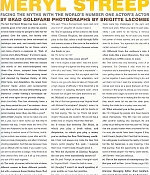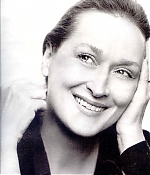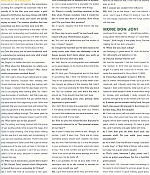|
Simply Streep is your premiere source on Meryl Streep's work on film, television and in the theatre - a career that has won her the praise to be one of the world's greatest working actresses. Created in 1999, we have built an extensive collection to discover Miss Streep's body of work through articles, photos and videos. Enjoy your stay.
|
Celebrating
25 years
of SimplyStreep
|
|
Meryl Streep: Facing the myths with the world's number one actor's actor
Interview Magazine ·
December 2002
· Written by Brad Goldfarb
|
The fact that Meryl Streep has been as consistently good at her work as she has seems to have made it easy for people to take her for granted. Over the years, her facility with accents and dialects has been minimized as technique over soul, and recently each time she’s been nominated for an Oscar-she’s won twice-there’s a response of, “Well, of course, she’s Meryl Streep.” It’s time to question that reflex and look at what this intelligent actress has achieved anew. With the release this month of two much-anticipated new films-The Hours, adapted from Michael Cunningham’s Pulitzer Prize-winning novel and directed by Stephen Daldry of Billy Elliot fame, and Adaptation, the latest from director Spike Jonze and screenwriter Charlie Kaufman, the duo behind Being John Malkovich (1999)-Streep’s formidable talent will once again be on glorious display.
BRAD GOLDFARB: This has obviously been a very busy period for you. I’m curious-have you abandoned your long-standing rule of never making more than one film a year?
MERYL STREEP: [laughs] I do try to make only one film a year, but it never works out that they’re released that way. I made these two films [The Hours and Adaptation] so far apart, but we ended up having to reshoot some of The Hours, including two entirely new scenes, a year after we’d finished principal photography, and after I’d finished shooting Adaptation. And that was because it was just so difficult a film to make. If you watch it you can see it’s almost like a collage. They filmed it as three distinct films, then cut it all up into pieces and sort of fit it back together.
BG: The book, of course, tells the tale of three different women in three different periods, but with a common thread linking them. Had you read it before the project came up?
MS: Yes. Natasha Richardson sent me the book. She said, “This is the best book I ever read. And you’re in it!” [laughs] Of course I read it.
BG: You’re speaking of the scene in the book when Clarissa Vaughan, the character you play in the film, takes a walk through SoHo and comes across a film crew in the midst of making a movie, including a famous actress she thinks is you.
MS: It’s funny, isn’t it?
BG: How did the film come about?
MS: I think maybe a year after I read the book I heard through my agents that they were making a film of it, and I said, “Well, that’s impossible”-it’s so interior a journey. But my agent said that David Hare was doing the adaptation, and there’s one guy who likes to take on things with a high degree of difficulty. I think David felt a lot of freedom in adapting Michael’s work, which Michael sort of gave him carte blanche to do.
BG: Michael is a generous guy.
MS: He is! But how generous was Virginia Woolf with Michael Cunningham? [laughs] I mean, he couldn’t really stand up there with his hands on his hips saying, “No, no, no. That’s not what I meant.” Because she couldn’t. Yet no one has a better read on Virginia Woolf than Michael.
BG: It seems that between The Hours, in which you play a book editor, and Adaptation, in which you play a writer, you’re circling the New York literary world.
MS: I think I will always only circle the New York literary world. [laughs] But, yeah, I suppose that’s true. I hadn’t really thought about it.
BG: Was the character of Clarissa Vaughan the one you were immediately drawn to?
MS: Oh, yes! Though, of course, I thought I could be Virginia Woolf-I have the built-in nose.
BG: [laughs] I wasn’t so much speaking of your profile as I was her gravitas.
MS: Well, I’ve always been intrigued by her. But the Clarissa role is the fulcrum of the story. I felt there were big challenges in the part, and there sure were. When you take my part separately I just seem to be having a nervous breakdown every day. As an actor you realize the power of those scenes, and yet you don’t want to do them. You approach the day with a certain amount of dread.
BG: Although from the audience’s side it often looks like a great liberation. Your role in Heartburn [1986] comes to mind.
MS: That scene was very liberating, more of an explosion. For Clarissa it was more like an implosion and a dismantling of the interior structure, getting down to the basement to see what put her together. It was a painful thing to do, and yet that’s not how I read the screenplay, which comes over more as a piece [between all three women]. In the script it’s almost as if one character inhales and I begin my scene with the exhale. One frustration for me in making the film was that they would never let me see the other parts. Having the inhale be a mystery was very odd.
BG: What attracted you to this project?
MS: I’m intrigued by people who have illusions about themselves. This film had one person after another walking into Clarissa’s life and pretty much telling her how they saw her. Things that are usually hidden were uncovered for her. I’m sure she would have been happier if they hadn’t been! [laughs] But I feel that her bravery, her willingness to embrace the reality of herself, her life, her happiness, is very inspiring. I like that journey. And the opportunity to play with some of these people-Ed Harris, Claire Danes, Jeff Daniels-was just delicious.
BG: One of the aspects of contemporary life that you nail in this part is the experience of being the caregiver for someone who’s terminally ill. In the film your soul mate, a poet (played by Ed Harris), has been living with AIDS for years, and his body and mind are finally saying no more. I’m curious whether that was something you drew on from your own life.
MS: Oh, I have lots of experience in this area-all the glorious and confounding and frustrating and sad and physically draining extremes of it. Both in terms of it being the best thing you can do in your life, and the horror of it, I think that’s all there in the film, and in the book, too. I felt very honest about all that.
BG: Over the years you’ve been burdened with a reputation for entering each role with a high degree of preparation.
MS: [laughs] I’m thrilled that that’s my reputation.
BC: What about for Adaptation, in which you play the writer Susan Orlean? Was there much preparation involved there?
MS: I didn’t get to know Susan beforehand or really do much research, because after meeting with Charlie Kaufman and then doing the reading with Nic [Cage], I realized that the real Susan and the one I’d be playing were nothing alike. So I didn’t have the burden of similitude. I feel that it was very important to the filmmakers that you believe this is the same woman from beginning to end. Spike was adamant that you could look back and believe that, even though there is this arbitrary turn the screenwriting takes halfway through. The viewer gets the story the Nic Cage character doesn’t want to write.
BG: What drew you to this project?
MS: The writing, and being involved with this group of very exciting artists: Chris Cooper, Nic Cage. And Spike is really amazing. One thing about making this film was that it was really lean moviemaking. It was fast and beautifully planned. There’s this cold steel intelligence to Spike Jonze that’s got the whole architecture of the day right up there in his brain at all times. He’s so prepared. I can’t tell you what a relief it is for an actor, because it doesn’t always happen that way.
BG: What was it about John Laroche [the subject of The Orchid Thief, around which Adaptation is based] that was so appealing for Orlean?
MS: I think that kind of iconoclast is like gold. Everything is built around crazy characters like this. Combined with his caginess and his horticultural knowledge and his defiance and his mutability, he’s a great subject for a journalist. He pulled her into ruminating on all these other things.
BG: There’s a really touching moment in the film when Orlean wonders what it would be like to have that kind of passion. How about you? Do you havethat passion?
MS: In spurts. [laughs] And then there’s the laziness factor.
BG: Now, lazy is not a word I’ve ever heard associated with you. Perfectionist, maybe…
MS: You can’t be a perfectionist and the mother of four. It doesn’t happen.
BG: Despite the fact that you’ve been famous for many years now, there are obviously a lot of things people don’t know about you, such as the fact that you have four kids.
MS: Well, they’re not photographed and celebrated as my appendages, no. As much as they’d love to be.
BG: Would they?
MS: Oh God, yes. Photographed and on the cover of something. But I think it’s terrible to do that. They’re not publicized by me, so they retain a certain integrity as citizens of this country that I don’t enjoy. I can’t sue anybody for what they say about me. But my children can, and that’s the way it should be. They should have their own lives.
BG: Has protecting your own privacy been important to your work?
MS: I don’t think it helps the suspension of disbelief if everybody knows where you work out. There’s so much that undermines our work as actors-promotion and stuff. It’s too bad.
BG: How do you feel about the fact that you’re commonly referred to as “the greatest actress of our time”?
MS: It doesn’t make any sense to me-though, of course, I wish it were true. There are so many incredible actors whose work inspires me every day and who I feel humbled by. It’s only the people in your profession or in the sports world who need to say, “This is the number one pick for this year.” I think if we could get the sports analogy out of the movies we’d all be better off.
BC: Last question: If one of your kids were to announce that he or she wanted to become an actor, what would you say?
MS: I give them advice all the time, and they never listen to me. [both laugh] I think acting’s a beautiful profession that’s full of heartbreak, and you have to be ready for that. If you can’t do anything else, go for it.
BG: I assume you couldn’t live without it.
MS: Well, I’m on the fence. I can’t live without it when I don’t have it. When I’m doing it I can. But I’m very happy, especially with the things coming out this year.












